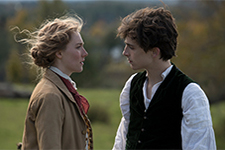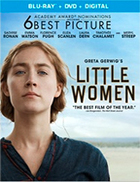Little Women
|  It came as something of a surprise to many that actress-turned-writer/director Greta Gerwig would follow her critically lauded and commercially successful solo directing debut Lady Bird (2017) with a new adaptation of Louisa May Alcott’s perennial 18th-century classic Little Women. Given that there are six previous film adaptations dating back to the silent era, there was first the question of “Do we really need another adaptation of Little Women?,” but also the surprise that Gerwig would take on what some immediately think of as a stodgy Victorian page-turner that would seem a far cry from the very modern dramatics of Lady Bird. Yet, looking at the two together, it is really not much of a surprise at all, and one can easily see how numerous thematic and narrative threads from Alcott’s novel found their way into Lady Bird. Both stories are essentially coming-of-age narratives about girls on the verge of womanhood navigating the difficult and prickly terrains of love, family, and the desire to make one’s way in the world. Gerwig clearly recognizes and appreciates the unique challenges faced by young women, and she brings out of Alcott’s novel the deep and conflicted nuances of her characters’ lives and, in the process, shows how not that much has really changed between 1868 and 2019. Heartbreak is still heartbreak. Family is still family. Conflict is still conflict. Envy is still envy. Love is still love. Little Women centers around the fictional March family, who live in a small town in Massachusetts, and it takes place during and after the Civil War. The four central characters are the March sisters, who are teenagers when we first meet them: eldest daughter Meg (Emma Watson), who is beautiful and conventional; middle daughter Jo (Saoirse Ronan), who is impulsive and creative and resistant to the traditional female roles of wife and homemaker; Amy (Florence Pugh), who yearns to be an artist and feels that she is constantly in her older sisters’ shadows; and Beth (Eliza Scanlen), the youngest and quietest daughter who is a gifted musician. Their father (Bob Odenkirk), a chaplain in the Union army, is away from the family for long periods of time, leaving everything up to the mother, Marmee (Laura Dern), who is loving and accommodating and incredibly patient, although she admits to Jo at one point that she was not always so. They live in what is often described as “genteel poverty,” meaning they still have a large house in which to live and can cover their basic necessities, but they have little social power and no means to buy and enjoy luxuries. Both Meg and Jo have to work to help the family maintain what little status it still has, which stands in direct contrast to their neighbor, Mr. Laurence (Chris Cooper), a wealthy widower who is raising his teenage grandson Laurie (Timothée Chalamet), who has eyes for Jo and is eyed by Amy. The Marchs have wealth in their family in the form of Aunt March (Meryl Streep), a rich old spinster who functions as the voice of extreme practicality, always insisting to the March sisters that they must marry for money and status since she does not believe they can attain them on their own. Gerwig sticks fairly close to Alcott’s novel, which was published in two volumes between 1868 and 1869. The narrative beats will be familiar to those who know the novel and/or its previous film adaptations (which include a 1933 version directed by George Cukor for which Katharine Hepburn won an Oscar playing Jo and a 1994 version—the most recent—directed by Gillian Armstrong). However, Gerwig has cleverly added a framing device involving the relationship between Jo, who aspires to be a writer, and a publisher named Mr. Dashwood (Tracy Letts). The film opens with Jo selling one of her stories to Mr. Dashwood, who marks out large sections of it and reminds her that people only want to read stories with female protagonists who end up either dead or married. Gerwig uses this device to comment on the nature of female-centered narratives both then and now, and as the film winds to its climax, which famously has Jo, who has long insisted that she will never marry, chasing down a handsome Italian professor (Louis Garrel) who has shown interest in her, we cut back to Jo selling to Mr. Dashwood what will become Little Women. This isn’t much of a stretch, since the novel was largely autobiographical and almost never saw the light of day because male publishers had no sense of what women would want to read, and it allows Gerwig to slyly comment on the forced necessity of certain endings in women’s fiction. This bit of meta-narrative intrusion doesn’t dampen the proceedings at all, but rather underscores how the story’s emotional highs and lows (what many often dismiss as its “sentimental” qualities) emanate from a warm sense of human understanding that even the most rank of commercial interests can’t dilute. Meta-narrative commentary aside, Little Women sucked me in entirely, taking me along the March sisters’ various plights in a way that was emotionally engaging and utterly absorbing. It is a fundamentally good story (which is probably why it has been brought so many times to screen—and I haven’t even mentioned its various stage and television adaptations), and I found it particularly appealing in our increasingly fraught, fractious, and anxious times because it centers on decent and flawed people trying to do the right thing. There are moments of breakdown, of course, such as when Amy, in a fit of envy over Jo, burns her sister’s novel-in-progress, which sends Jo into a fury from which she might never return, but overall the characters are portraits of the struggle for human decency. If I may offer a variation on what I wrote two years ago about Lady Bird: I have never been a young women in the late 19th-century navigating complex family dynamics and trying to overcome my family’s limited economic means, but Little Women manages such a beautiful and delicate balance between the universal and the highly specific that I feel like I could have been.
Copyright © 2020 James Kendrick Thoughts? E-mail James Kendrick All images copyright © Sony Pictures Home Entertainment | |||||||||||||||||||||||||||||
Overall Rating: 


 (3.5)
(3.5)


